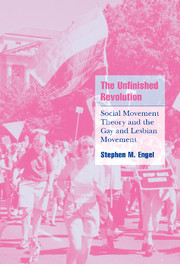Book contents
- Frontmatter
- Contents
- Notes on language
- Preface
- Introduction
- 1 Asked and answered: how questions can condition conclusions in social movement theory
- 2 Tracing the rainbow: an historical sketch of the American gay and lesbian movement
- 3 Tracing the rainbow: an historical sketch of the British gay and lesbian movement
- 4 Where and how it comes to pass: interest group interaction with political institutions
- 5 Asking the unasked question: grappling with the culture variable
- Conclusion
- Appendix: a survey of social movement theories
- Notes
- Bibliography
- Index
5 - Asking the unasked question: grappling with the culture variable
Published online by Cambridge University Press: 31 October 2009
- Frontmatter
- Contents
- Notes on language
- Preface
- Introduction
- 1 Asked and answered: how questions can condition conclusions in social movement theory
- 2 Tracing the rainbow: an historical sketch of the American gay and lesbian movement
- 3 Tracing the rainbow: an historical sketch of the British gay and lesbian movement
- 4 Where and how it comes to pass: interest group interaction with political institutions
- 5 Asking the unasked question: grappling with the culture variable
- Conclusion
- Appendix: a survey of social movement theories
- Notes
- Bibliography
- Index
Summary
Political culture … is an elusive concept that is difficult to capture empirically. But it is hard to avoid the impression – even if it is difficult to demonstrate – that the most far-reaching impacts of cycles of protest are found in slow and incremental changes in political culture.
Sidney Tarrow, Power in MovementAfter the last paradigm shift to resource and structural analyses, social movement literature reacted by rehabilitating the social psychological study of movement participation. Let us not make the same mistake for the second time and turn our backs on those areas where social psychology, structural analyses, and rational choice might prove more powerful in favor of a totalizing theory that – ultimately – never can be.
Hank Johnston and Bert Klandermans, “The Cultural Analysis of Social Movements”Structural bias: beyond the political process model
In reference to the 2000 election cycle in the United States, Time magazine columnist Margaret Carlson wrote
In 1992, not only would no one bring up gaydar, but also the subject of gays in the military was not nearly the preoccupation it is this time … With the exception of the novelty candidates, what this campaign shows is that the country has moved some distance in its acceptance of gays. Two years ago, gay bashing was a staple of the Republican right. Lately, Republicans have largely gone quiet since their pollsters warned them to knock it off. Spreading scare stories about gays just wasn't working. […]
- Type
- Chapter
- Information
- The Unfinished RevolutionSocial Movement Theory and the Gay and Lesbian Movement, pp. 123 - 157Publisher: Cambridge University PressPrint publication year: 2001

